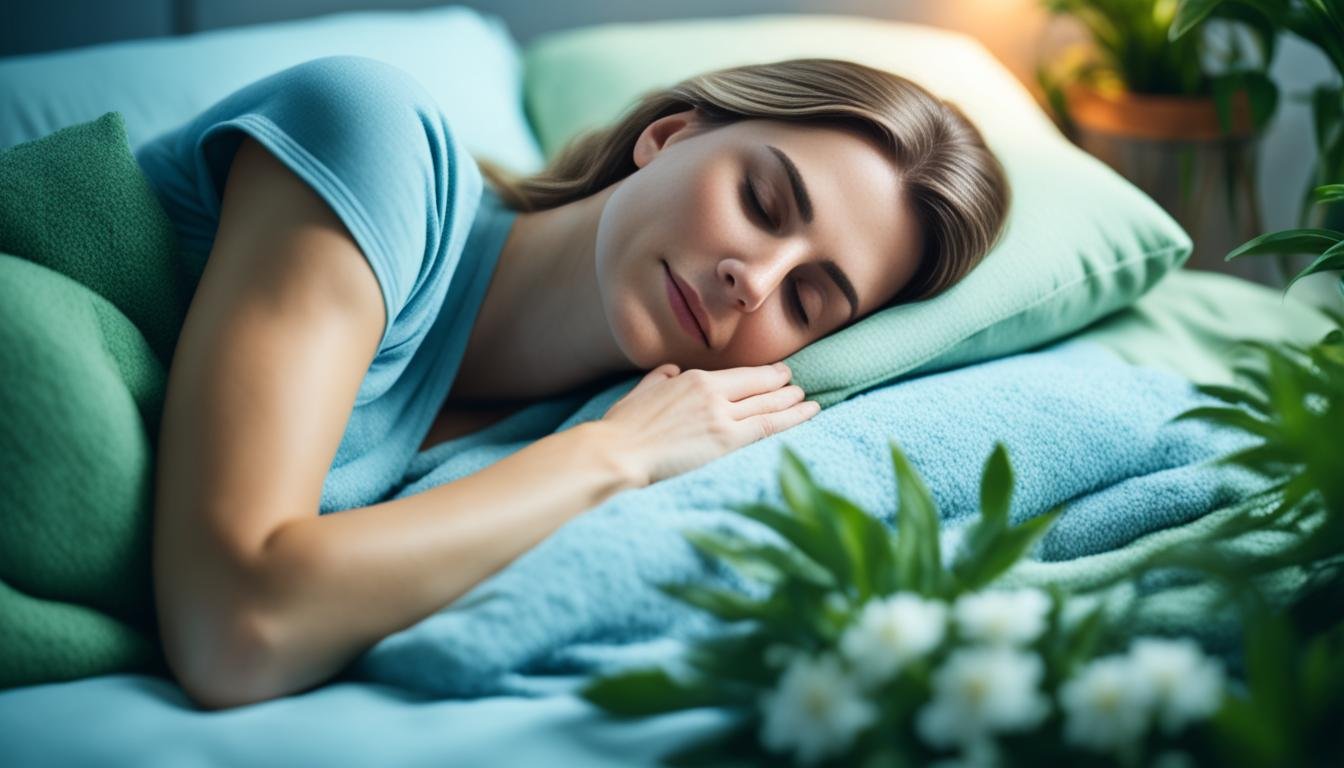In our fast-paced, high-stress world, finding peace might seem hard. But, what if the answer is in something simple: good sleep? We know sleep helps with stress, but how does it do it? Understanding this could change our lives for the better.
Sleep and stress are closely linked. They affect each other deeply. By learning how they work together, we can use sleep to ease stress. This could lead to a healthier, more balanced life. Let’s dive into how sleep can be a key to managing stress and feeling better overall.
Key Takeaways
- Sleep is key in controlling stress hormones like cortisol, helping the body find balance.
- Good sleep keeps the brain’s pathways working right, which helps with handling stress and emotions.
- Not getting enough sleep can make inflammation and stress hormones go up, making stress worse.
- Using relaxation techniques and sticking to a sleep schedule can make sleep better and lower stress.
- Living a healthy life with a good diet and exercise can also improve how sleep affects stress.
Introduction
Sleep is key to our health and happiness. It helps keep our body, mind, and emotions in balance. Getting enough good sleep is vital for our sleep deprivation, mental health, and physical health.
The Impact of Stress on Our Well-Being
Stress affects our health in big ways, both mental and physical. It can cause anxiety, depression, heart disease, and weaken our immune system. Long-term stress messes with our body’s balance, leading to hormonal issues and brain problems.
Sleep and stress are closely linked. Stress can make it hard to sleep well, starting a cycle of poor sleep and more stress. This cycle hurts our well-being, making everyday tasks harder, reducing our productivity, and lowering our life quality.
if you would like to have a good sleep in 2 minutes click here
“Sleep is the golden chain that ties health and our bodies together.” – Thomas Dekker

Knowing how sleep and stress interact is key to handling them better. By focusing on good sleep and reducing stress, we can boost our physical and mental health. This leads to better well-being.
Understanding the Sleep-Stress Connection
The link between sleep and stress is fascinating and complex. Good sleep is key to keeping our body’s hormones and neurotransmitters in balance. This balance affects how stressed we feel.
The hormone cortisol, known as the “stress hormone,” is central to this link. Cortisol helps us handle stress, but we need to keep its levels right. Sleeping well helps keep cortisol in check, making sure it’s high in the morning for energy and low at night for sleep.
Sleep also affects other important hormones like melatonin, growth hormone, and thyroid hormones. These hormones keep our body and mind balanced. If their levels get out of whack, stress can go up.
Neurotransmitters, like serotonin, dopamine, and gamma-aminobutyric acid (GABA), play a big role in how we feel and think. They help us relax and manage stress. When we sleep well, these neurotransmitters work better, making us feel less stressed.

“The relationship between sleep and stress is a two-way street. Stress can disrupt sleep, and poor sleep can make stress worse. Understanding this connection is key to a healthy life.”
By understanding how sleep, hormones, and neurotransmitters interact, we can use sleep to reduce stress. This knowledge helps us make the most of sleep for our health and happiness.
How Does Sleep Reduce Stress
Quality sleep is key to lowering stress and bringing the body back into balance. It’s important to know how sleep helps with stress to see why good sleep habits matter.
Restoring the Body’s Natural Balance
Sleep lets the body reset and recharge. It helps control hormones and neurotransmitters vital for a healthy stress response. Good sleep brings the body back to a balanced state, making it easier to handle daily life.
Regulating Hormones and Neurotransmitters
Sleep is crucial for managing hormones and neurotransmitters that affect stress. For instance, it helps keep cortisol, a stress hormone, in check. This prevents the bad effects of too much stress.
Sleep also keeps neurotransmitters like serotonin and dopamine balanced. These chemicals help with mood and stress control. With sleep, the body can handle stress better and stay resilient.
Sleep’s power to fight stress is amazing. By knowing how sleep affects the body’s balance, hormones, and neurotransmitters, we can make sleep a priority. This helps us manage stress better.
The Effects of Sleep Deprivation on Stress Levels
Many people today struggle with not getting enough sleep. This can greatly affect stress levels. Not sleeping well can throw off our body’s stress balance, leading to health problems.
Increased Cortisol and Inflammation
Sleep deprivation messes with cortisol, a key stress hormone. Without enough sleep, cortisol stays high even when there’s no stress. This can lead to more inflammation in the body.
This inflammation is linked to heart disease, type 2 diabetes, and mental health issues like depression and anxiety.
| Sleep Deprivation | Healthy Sleep |
|---|---|
| Elevated cortisol levels | Balanced cortisol levels |
| Increased inflammation | Reduced inflammation |
| Heightened stress response | Improved stress management |
The table shows how sleep affects cortisol, inflammation, and stress. Getting enough sleep helps manage stress and supports health.
The image shows how not sleeping well can lead to more stress and inflammation. Knowing this helps us find ways to handle stress and stay healthy.
Stress Management Techniques Involving Sleep
Getting enough good sleep is key to managing stress well. By learning how sleep and stress are linked, people can add sleep-focused methods to their health routine. These methods improve sleep and help lower stress, making mental health better.
Establishing a Consistent Sleep Routine
Creating a steady sleep schedule is a big step in managing stress with sleep. This means going to bed and waking up at the same time every day, even on weekends. A regular sleep cycle helps keep your body’s clock in check, which is vital for handling stress and staying healthy.
Implementing Relaxation Techniques
Adding relaxation methods to your bedtime can make your sleep better and cut stress. Techniques like deep breathing, muscle relaxation, and mindfulness meditation calm your mind and body. This makes sleep more refreshing and helpful.
Optimizing the Sleep Environment
Your sleep space greatly affects how well you sleep. A dark, quiet, cool bedroom helps you sleep better and manage stress. A good mattress and pillows, along with avoiding blue light from screens before bed, also help you sleep well.
| Sleep Technique | Description | Benefits for Stress Management |
|---|---|---|
| Consistent Sleep Routine | Maintaining a regular sleep-wake cycle by going to bed and waking up at the same time each day. | Regulates the body’s circadian rhythm, promoting better sleep quality and improved mental health. |
| Relaxation Techniques | Incorporating practices like deep breathing, progressive muscle relaxation, and mindfulness meditation into the bedtime routine. | Helps calm the mind and body, facilitating a more restful and restorative sleep, which can effectively reduce stress levels. |
| Optimized Sleep Environment | Ensuring the bedroom is dark, cool, and quiet, with a comfortable mattress and minimal exposure to blue light. | Promotes better sleep quality, which is essential for maintaining stress management and overall well-being. |
Using these sleep techniques in your stress management plan can help you. It can make your mental and physical health better. This leads to a more balanced and strong life.
Creating a Sleep-Friendly Environment
Getting good sleep is key to lowering stress and boosting well-being. To make your bedroom sleep-friendly, focus on setting up your room right and sticking to a sleep schedule.
Optimizing Your Bedroom for Better Sleep
Your bedroom’s setup is key to how well you sleep. Here are some tips to make it sleep-friendly:
- Keep the room cool, dark, and quiet. Use blackout curtains or an eye mask for light, and earplugs or a white noise machine for noise.
- Keep the temperature between 65°F and 70°F (18°C to 21°C) for the best sleep.
- Choose comfy bedding, like a supportive mattress and pillows that keep your spine aligned.
- Keep devices like TVs, smartphones, and laptops out of the bedroom to avoid blue light interference.
Establishing a Consistent Sleep Routine
Having a regular sleep schedule can make your sleep better and lower stress. Here are some tips for a consistent sleep routine:
- Stick to the same bedtime and wake-up time every day, even on weekends, to keep your body clock in sync.
- Do relaxing things before bed, like reading, taking a warm bath, or stretching, to help you sleep.
- Avoid exciting activities or caffeine close to bedtime.
- Stay away from screens and bright lights at night to help your body make melatonin.
By making your bedroom sleep-friendly and sticking to a sleep routine, you can improve your sleep hygiene. This supports your body’s stress reduction and leads to better sleep and health.
| Sleep Environment Factors | Ideal Conditions |
|---|---|
| Temperature | 65°F to 70°F (18°C to 21°C) |
| Lighting | Dark, with blackout curtains or eye mask |
| Noise | Quiet, with earplugs or white noise machine |
| Bedding | Comfortable, supportive mattress and pillows |
| Electronics | Minimal to no use of devices before bed |
“The quality of your sleep environment can greatly impact the quality of your sleep, and ultimately, your overall health and well-being.”
if you would like to have a good sleep in 2 minutes click here
Relaxation Techniques for Better Sleep
Getting good sleep is key to handling stress and staying healthy. Luckily, there are many ways to make sleep better. Mindfulness and meditation are top choices for a peaceful night.
Mindfulness and Meditation Practices
Mindfulness and meditation are known for cutting stress and boosting sleep. They focus on the now, letting you notice thoughts and feelings without judgment. These activities help you deal with stress and anxiety, which can stop you from sleeping well.
They also help control the body’s stress response. A busy mind keeps the body awake. Mindfulness teaches you to ignore distracting thoughts and focus on breathing or feelings. This helps your body relax.
- Guided meditations offer a clear path for beginners.
- Body scans help relax each body part, getting you ready for sleep.
- Deep breathing exercises calm the mind and balance the nervous system.
Adding mindfulness and meditation to your day can make you more relaxed. This leads to better sleep and less stress.
Using these relaxation methods can greatly improve your life. By focusing on sleep and practicing mindfulness, you can make sleep a powerful tool. This helps you handle life’s ups and downs better.
The Role of Diet and Exercise in Sleep and Stress Reduction
Keeping a healthy lifestyle is key to handling stress and better sleep. Eating a diet full of nutrient-rich foods and staying active helps your overall health.
Eating foods like leafy greens, fatty fish, nuts, and seeds helps balance your body’s hormones. This is important for good sleep. Drinking plenty of water and avoiding too much caffeine and alcohol also helps sleep and lowers stress.
Exercise like brisk walking, yoga, or lifting weights is great for sleep and stress. It cuts down cortisol, the stress hormone, and boosts endorphins. These can make you feel happier and less anxious or sad. Try to exercise for at least 30 minutes most days to enjoy the benefits of a healthy life.
FAQ
How does sleep help reduce stress?
Sleep is key to balancing the body’s hormones and neurotransmitters, which affects stress. Good sleep helps fix the body’s balance. It lowers stress hormones like cortisol and keeps neurotransmitters in check for managing stress.
What are the effects of sleep deprivation on stress levels?
Not getting enough sleep can mess with cortisol levels and increase inflammation. This makes stress worse and harms health. It also messes with hormones and neurotransmitters, making stress even higher.
What are some stress management techniques that involve sleep?
Using sleep-focused practices can really help with stress. Start with a regular sleep schedule and make your bedroom sleep-friendly. Also, try relaxation techniques like mindfulness and meditation to sleep better.
How can diet and exercise influence sleep and stress reduction?
Eating right and staying active can help improve sleep and lower stress. A healthy lifestyle with good food and exercise helps regulate hormones and sleep patterns. It also makes you more resilient to stress.
What is the importance of sleep hygiene for managing stress?
Good sleep habits, like a sleep-friendly bedroom and a regular sleep schedule, are crucial. They help you sleep well and manage stress better. Having the right sleep habits and conditions can balance the body, regulate hormones, and support your overall health.
